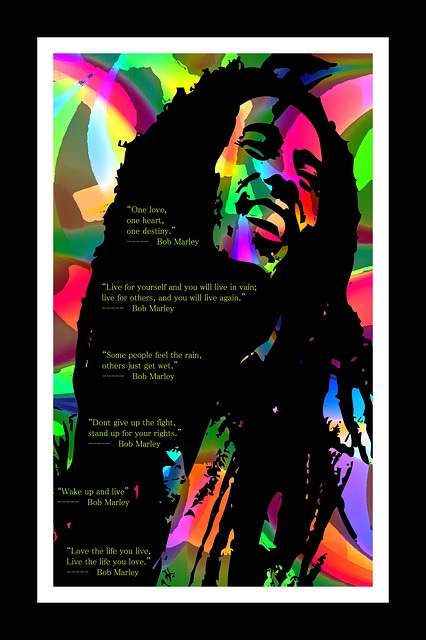"One Love" by Bob Marley
It has always been one of my favorite songs and is even more relevant today than when it was first written.
“It’s a song of unity; it’s a song that unites everyone,” said Cedella Marley, his daughter, in a 2020 interview. ”When Daddy was writing this song, I don’t think color, creed, or social status mattered. It’s really a song of just appreciating the human family, which is all of us.”
"One love, one heart / Let’s get together and, feel all right / Hear the children crying (one love) / Hear the children crying (one heart) / Sayin’, give thanks and praise to the Lord and I will feel all right / Sayin’, let’s get together and feel all right / Whoa, whoa, whoa, whoa.” - Americansongwriter.com.
"Marley's idea was that everyone in the world should stop fighting and become one - a similar sentiment to John Lennon's "Imagine" and George Harrison's "Give Me Love (Give Me Peace On Earth)." There is, however, a deeper meaning behind the song than a simple call for unity. Some of the lyrics are about oppression and how sinners will pay for their evil deeds in the end. For many listeners, the deeper message is lost in the overwhelming chorus." -songfacts.com
"One Love" by Bob Marley is a powerful anthem that has transcended its reggae roots to become a universal message of peace, unity, and compassion. Through its simple yet profound lyrics, the song invites listeners to reflect on the interconnectedness of humanity and the importance of coming together to create a better world. The essence of "One Love" lies in its appeal for universal brotherhood and eliminating barriers that divide people, such as race, class, and nationality.
Bob Marley, a prominent figure in reggae music and a Rastafarian, used his platform to address social and political issues, advocating for peace, love, and understanding. "One Love" serves as a testament to his belief in the power of love to overcome hatred and division. The song's chorus, with its repeated call for "one love" and "one heart," emphasizes that we are all part of a single human family. This message resonates in a world often marred by conflict and division, reminding us of the common humanity that binds us.
The lyrics of "One Love" also touch upon forgiveness and the importance of letting go of past grievances. Marley encourages listeners to come together and make amends, highlighting that unity and reconciliation can pave the way for a brighter future. This message is encapsulated in the line that urges us to "feel all right," suggesting that harmony and understanding can bring a sense of well-being and contentment.
Moreover, "One Love" reflects Marley's deep spiritual beliefs, drawing upon the Rastafarian idea that love is the most powerful force in the universe. The song's appeal to "give thanks and praise to the Lord" underscores the spiritual dimension of its message, advocating for gratitude and a recognition of a higher power in the quest for unity and peace.
The enduring popularity of "One Love" is a testament to its universal appeal and the timeless nature of its message. It has been embraced by diverse audiences worldwide, serving as a rallying cry for various social and humanitarian causes. The song's simple yet powerful message has inspired countless individuals to strive for a world where love triumphs over hate and division.
In conclusion, "One Love" by Bob Marley is more than just a song; it is a call to action for humanity to unite in love and compassion. Its message encourages us to look beyond our differences and work together toward a world characterized by peace, understanding, and mutual respect. Through its enduring legacy, "One Love" reminds us of the transformative power of love and the possibility of a united world.





Some recordings of "One Love" feature Marley performing it in tandem with Curtis Mayfield's "People Get Ready", which has a very similar message.
I grew up listening to the reggae music of the 1980's. In addition to Bob, there are many others of the time who were teaching the words of inspiration like love and brotherhood. Its what gave us, the children of the Commonwealth (or the babies slaves and colonizers) hope, as maintaining imperialism was getting too expensive for the United Kingdom.
There were others, like Peter Tosh, Gregory Issacs, Freddie McGreggor and more. They were not Bob Marley famous, in that they didn't break into American pop culture, but on my little island of Saint Lucia, those beats were what people partied to, played all day on the radio, and listened to on those records and cassette tapes.